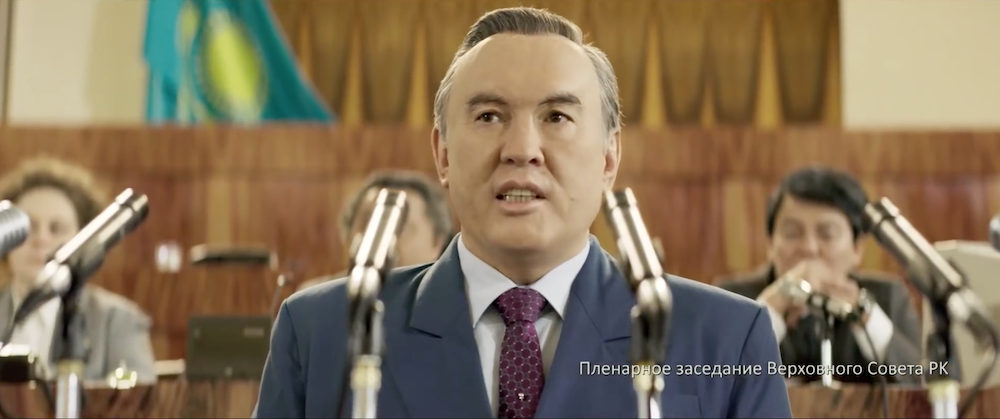 The movie is a forgettable addition to the presidential cult of personality.
The movie is a forgettable addition to the presidential cult of personality.
“What began as the dream of one man has now become the victory of a whole nation.”
These are among the last words spoken by the narrator in Leader’s Path: Astana, the latest in a series of fawning, state-funded biopics about Kazakhstan’s President Nursultan Nazarbayev.
Even by the overtly propagandistic standards of the Leader’s Way series, which debuted in 2011, film number six is clumsy.
That was perhaps predictable, given the plot, which centers around Nazarbayev’s contentious decision in the 1990s to move the capital city to a barren and freezing location in the middle of the steppes. The founding of Astana is billed in state accounts as the crowning achievement of the president’s three decades in power.
But the plodding telling of this tale makes for tedious viewing and the intended regime-boosting effect is accordingly weak as a result.
A Eurasianet correspondent made three attempts to watch the movie, whose release coincided with the December 16 independence holiday.
On the first occasion, the correspondent was turned back from a cinema on the outskirts of Almaty because there were no spare seats.
“A school party arrived,” explained the box office cashier.
The second time, the correspondent found himself entirely alone in the movie theater. The Russian-language film had been dubbed into Kazakh.
A showing at a third cinema was slightly better attended. In addition to the correspondent, there was a man and his elderly mother, a former school teacher. Both said afterward that they had enjoyed the one-and-a-half hour production.
“It is history,” said the man.
That may be, but the truth is that the choice of theme for Leader’s Way: Astana, which was directed by Akan Satayev, desperately lacks for dramatic tension.
By being set in the Soviet era, previous entries in the series were on more promising ground. Their appeal lay in seeing how the filmmakers responded to a political and creative challenge: How to portray the ills of Soviet rule while also promoting Nazarbayev, a product of that system?
In the Astana film, the cast of characters is dominated by the officials that ushered in the era of independence. Among them is Adilbek Dzhaksybekov, the new capital’s first mayor and, until recently, chief of staff in the Nazarbayev administration.
His portrayal in the film as a toadying yes-man is notably a self-portrayal – the 64-year-old is credited as the screenplay's co-author.
Nazarbayev, whose voice is unerringly mimicked by Murat Akhmanov, is shown as the only true believer in Astana. His resolve is unaffected by polling that showed less than a quarter of citizens favored relocating the seat of power from Almaty, a leafy city set scenically in the foothills of the Tien-Shan, to a frigid, mosquito-infested spot 1,000 kilometers further north.
When Nazarbayev aired the idea in parliament in 1994, he was greeted with dissent and even laughter. Even his wife, Sara, asked him to hold off for a few years.
Well, few are laughing now, but maybe not for reasons Nazarbayev would appreciate. Astana has indeed grown into a million-strong metropolis graced with quirky architecture that rarely fails to impress short-term visitors. And yet, despite having been built from scratch, the city is scourged by a legacy of poor planning, high construction costs, lack of public spaces, smog and the notoriously brutal winter. Little of this is mentioned in the movie, of course.
What matters is the narrative arc of Nazarbayev overcoming the odds to transform a dreary provincial town once called Akmola, or white grave, into a shining city in the steppe.
“Where others saw difficulties, the president saw only possibilities,” recalls the film’s narrator, a close aide from the time.
Some moments hint at what the film might have been had it been unshackled from the Nazarbayev personality cult.
In one passage, the president visits the home of a family that has just moved to Astana from western Kazakhstan. The family is full of optimism but struggling as the development of infrastructure cannot keep pace with the population growth. Following these settlers might have added a human touch.
As this is hagiography, however, it is Nazarbayev who gets all the attention. So there is the scene of him speaking to his mother in a daytime reverie. And his tennis match with Russian President Boris Yeltsin. It is only moments like these that disrupt the tedium of recreations of cabinet meetings, political speeches and working visits to Astana.
A baddie is included to inject some drama. That role falls to Akezhan Kazhegeldin, who was prime minister in the mid-1990s and later went into opposition. Wherever Kazhegeldin appears, he is shown as a lazy Machiavellian, ducking his executive responsibilities and scheming to undermine Nazarbayev in order to seize power.
Leaving aside the ethical considerations of spending government money on smearing opposition figures, these scenes are too few and brief to make a convincing villain of Kazhegeldin.
Even in propaganda films, Nazarbayev’s political opponents get next to no screen time.
EurasiaNet.Org, Jan 4, 2019




